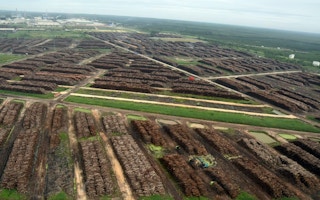Indonesian pulpwood giant Asia Pulp and Paper (APP) has said that it intends to reduce its greenhouse gas emissions to net-zero in support of climate action, and can do so while expanding its operations.
In an interview with Eco-Business, APP said that it aimed to achieve net-zero emissions by 2060, in line with the Indonesian government’s own carbon reduction target, set in August last year.
The Jakarta-headquartered company is planning for a 30 per cent reduction in carbon emissions by 2030, just ahead of the Indonesian government’s commitment to reduce emissions by 29 per cent by the same deadline.
APP said it is looking into setting a science-based target, which would align emissions reductions with the Paris Agreement aim to cap global warming at 1.5 degrees Celsius above pre-industrial levels.
APP’s carbon footprint is subject to debate, as the company does not include greenhouse gases (GHG) released from its operations on carbon-rich peatlands, such as emissions from fire and peatland subsidence, in its calculation.
The company said that its current total GHG footprint is based on emissions from its mills.
More than half of APP’s 1.2 million hectares of plantations are on peat soil, which when drained for agriculture, is vulnerable to the smoggy fires that have dogged the region with toxic haze air pollution for decades.
A third of the fires from the severe 2015 haze outbreak that affected Singapore are believed to have come from APP land. The most recent severe haze outbreak in 2019 produced the annual emissions of Spain in a single month.
According to its 2020 sustainability report, APP’s Scope 3 emissions — a category of greenhouse gas emissions which covers those from a company’s value chain, including suppliers — are 23.4 million tonnes of carbon dioxide equivalent (tCO2e), roughly half the annual emissions of Singapore.
Data from Environmental Paper Network, a non-government organisation, estimates that APP’s annual emissions from its plantations on dried peat alone are 44 million tCO2e, equivalent to the annual emissions of Norway.
Without addressing the massive greenhouse gas emissions from the peatlands APP drained for their plantations, any net-zero plan by APP is a joke and greenwash.
Kiki Taufik, global head, Indonesia forest campaign, Greenpeace
Going net-zero while expanding
Chief sustainability officer, Elim Sritaba, told Eco-Business that APP would reduce its carbon exposure by improving energy efficiency and using renewable energy. APP defines black liquor, a bi-product of the wood pulping process, as a renewable fuel resource.
Measures taken to improve its practices on peatlands will also help to reduce emissions, Sritaba said, adding that the company would retire some operations on “critical” peat areas known as peat domes, thick layers of the high-carbon soil.
The company said it will be able to achieve net-zero, even though its strategy focuses on reducing emissions intensity — the volume of emissions per unit of production — rather than absolute emissions.
“While overall emissions reduction is important, we believe carbon intensity will provide the true measure of our efficient use of resources and play an important role in helping APP transition to more efficient operations and help the company identify key decarbonisation drivers,” she said.
“Carbon intensity per tonne of production is important because capping carbon intensity at or near the same level helps ensure we don’t increase our impact on the environment in a negative way,” she added.
By controlling carbon intensity, net-zero can also be achieved even if the company expands, she said.
APP’s plan to ramp up production emerged last year. It aims to increase the capacity of Ogan Komering Ilir (OKI), its massive mill in South Sumatra, from 2.8 million tonnes to 7 million tonnes per year.
“To expand OKI, we will use biomass not coal. In terms of carbon emissions, they will not increase significantly,” said Sritaba.
Environmentalists worry that an expanded OKI mill will have “grave consequences” for Indonesia’s forests and peatlands, because the company does not have sufficient plantation fibre to keep the mill running at full capacity. APP has denied this.
A coalition of NGOs, which includes WAHLi, Greenpeace and Forest Peoples Programmes, notes that the plantation concessions of the top suppliers to OKI mill were among the worst burned areas in the 2015 and 2019 haze seasons, two of the most severe bouts of transboundary haze on record.
APP’s suppliers released approximately 430 million tCO2e between 2015 and 2019, an average of 86 million tCO2e per year, equivalent to the annual emissions of 23 coal-fired power plants, according to data from the group.
The expansion plans for OKI are subject to permit approval, which is still pending, Sritaba said.
APP will be consulting stakeholders and seeking advice from consultants to develop the net-zero strategy and roadmap ahead of an official launch, she added.
It is too early to consider how APP could use forested areas on its land to sell carbon credits to offset its emissions, Sritaba said, as Indonesia currently prohibits the sale of carbon credits on the international market.
She said that APP would use carbon credits to offset to own emissions, but also to “support the achievement of Indonesia’s NDC [Nationally determined contributions, efforts made by countries to achieve the goals of the Paris climate accord]”.
‘Greenwash’
Greenpeace, an environmental group that helped APP forge a landmark commitment to stop cutting down natural forest in 2013, is sceptical about the company’s net-zero plan.
“Without addressing the massive greenhouse gas emissions from the peatlands APP drained for their plantations, any net zero plan by APP is a joke and greenwash,” said Kiki Taufik, global head of Greenpeace’s Indonesia Forest Campaign.
“An expansion of capacity means more emissions, even if it is a ‘lower intensity’,” he said.
“APP’s emissions will remain unconscionably high as long as it continues to operate on peat. In order to reduce carbon emissions substantially, the company must deal with its legacy by fully rewetting and restoring all peatlands it has operated on (with flood tolerant species),” said Taufik.

















